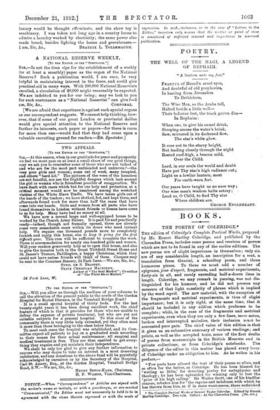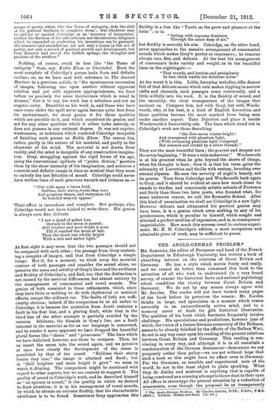BOOKS.
THE POETRY OF COLERIDGE.* THE edition of Coleridge's Complete Poetical Works, prepared by Mr. Ernest Hartley Coleridge, and published by the Clarendon Press, includes some poems and versions of poems. which are not to be found in any of the earlier. editions. The new poems are of slight importance in themselves ; only sin are of any considerable length, an inscription for a seat, a translation from Guarini, a schoolboy poem, and three• humorous pieces. To these we must add a number of epigrams, jeux d'esprit, fragments, and metrical experiments, forty-six in all, and rarely exceeding half-a-dozen lines in length. Coleridge, we may remark in passing, was not dis-
tinguished for his humour, and he did not possess any • measure of that light causticity of phrase which is implied
by the word esprit. The new material, with the exception of the fragments and metrical experiments, is thus of slight importance; but it is only right, at the same time, that it
should be included in any edition which professes to be complete; -while, in the case of the fragments and metrical experiments, even when they are only a few lines, mere notes, broken and interrupted melodies, their inclusion must be
accounted pure gain. The chief value of this edition is that it gives us an exhaustive summary of various readings ; and prints, as well as the accepted texts, some of the first drafta of poems from manuscripts in the British Museum and in private collections, or from Coleridge's notebooks. The diligence of the editor in this matter has placed every lover of Coleridge under an obligation to him. As he writes in his preface,— "Few poets have altered the text of their poems so often, and so often for the better, as Coleridge. Ho has been blamed for 'writing so little,' for deserting poetry for metaphysics and theology ; he has been upbraided for winning only to lose the 'prize of his high calling.' Sir Walter Scott, one of his kindlier censors, rebukes him for ' the caprice and indolence with which he has thrown from him, as if in mere wantonness, those unfinished • The Complete Poetical Works of Samuel Taylor Coleridge. Edited by Ernest: HartleyColeridge. Two Tole. Oxford : At the Clarendon Prom [10e. net.] scraps of poetry which, like the Torso of antiquity, defy the skill of his poetical brethren to complete them.'. But whatever may he said for or against Coleridge as an inventor of harmonies,' neither the fineness of his self-criticism nor the laborious diligence which he expended on perfecting his inventions can be gainsaid. His erasures and emendations are not only a lesson in the art of poetry, not only a record of poetical growth and development, but they discover and reveal the hidden springs, the thoughts and passions of the artificer."
Nothing, of course, could be less like "the Torso of antiquity " than, say, Kubla Khan or Christabel. Even the most complete of Coleridge's poems lacks form and definite outline; or, as we have said with reference to The Ancient Mariner in a previous article, in " the spontaneous succession of images, following one upon another without apparent
relation and yet with apparent appropriateness, we have before us precisely the same incoherence which is usual in
dreams," that is to say, his work has a nebulous and not an organic unity. Beautiful as his work is, and those who have -once come under the spell never again become quite free from -its enchantment, we must praise it for those qualities which are peculiar to it, and which constitute its genius, and not for any other qualities which it either lacks entirely, or does not possess in any eminent degree. It was not caprice, wantonness, or indolence which rendered Coleridge incapable of finishing such poems as .Kubla Khan. The reason lies, rather, partly in the nature of his material, and partly in the character of his mind. The material is not drawn from reality, and the mind is incapable of any constructive imagina- tion. Gray, struggling against the rigid forms of his age, using the conventional epithets of "poetic diction," masters them by the sheer intensity of his imagination, and achieves a concrete and definite image in lines so musical that they seem to embody the last felicities of sound. Coleridge could never have written lines of such generous warmth and richness as :—
" Girt with many a baron bold, Sublime, their starry fronts they rear, And gorgeous dames, and statesmen old In bearded majesty appear."
-Their effect is immediate and complete. But perhaps, also, Coleridge would not have wished to write them. His genius
is always rare, fine, delicate.
"I saw a cloud of palest hue, Onward to the moon it passed ;
Still brighter and more bright it grew
Till it reached the moon at last. Then the cloud was wholly bright With a rich and amber light."
At first sight it may seem that the two passages should not be compared with each other ; the passage from Gray contain- ing a complex of images, and that from Coleridge a simple image. But if, for a moment, we think away the material .content of both passages and consider the sound alone, we perceive the mass and solidity of Gray's lines and the swiftness • and fluidity of Coleridge's, and find, too, that the distinction is not caused by the metrical differences, but almost entirely by the management of consonantal and vowel sounds. The genius of both consisted in these refinements, which, since they have little or nothing to do with rhythmical or metrical effects, escape the ordinary ear. The faults of both are suffi- ciently obvious; indeed, if the comparison be at all unfair to Coleridge, it is because the quotation from Lewti contains a fault in the first line, and a glaring fault, while that in the third line of the other example is partially avoided by the caesura. Sibilants, the blemish in Gray's line, are a fault inherent in the material as far as our language is concerned, and to render it more apparent we have dropped the beautiful plural forms like " &boon " and " prim rosen." The lines which we have italicized, however, are those to compare. Then, let us insert the sense into the sound again, and we perceive at once how closely the development of the sense is paralleled by that of the sound. " Sublime their starry fronts they rear," the image is attained and fixed ; but in "Still brighter and more bright it grew" we seem to Watch it dilating. The comparison might be continued with regard to other aspects, but we are content to suggest it. The quality of sound in Coleridge's work, and he described himself as " an epicure in sound," is the quality to which we desired to draw attention ; it is in his management of vowel sounds, by which he attains an extreme fluidity, that his characteristic excellence is to be found. Sometimes Gray approaches this fluidity in a line like "Youth on the prow and pleasure at the helm " ; or in
" Sailing with supreme dominion
Through the azure deep of air,"
but fluidity is scarcely his aim. Coleridge, on the other hand, never approaches to the massive arrangement of consonantal sounds which makes Gray's poetry so impressive ; he remains always rare, fine, and delicate. At the best his management
of consonants lacks variety and weight, as in the beautiful lines on the nightingale:— "That crowds, and hurries and precipitates
In fast, thick warble his delicious notes."
At the worst it is thin. Little, hurrying melodies, elfin dances full of that delicate music which rain makes rippling in narrow clefts and channels, such passages come continually, and a little wilfully into his work. It is the fluidity of sound, and the unreality, the clear transparence of the images that enchant us. Compare him, not with Gray, but with Words- worth, who, at his best, is a kind of English Lucretius, and these qualities become the more marked from being seen under another aspect. Take Dejection and place it beside Wordsworth's Immortality ode. The lines which stand out in Coleridge's work are those describing
"the New-moon winter-bright ! And overspread with phantom light, (With swimming phantom light o'erspread But rimmed and circled by a silver thread)."
They are the most beautiful lines ; the gravest and deepest are the seven beginning, " It were a vain endeavour." Wordsworth is at his greatest when he gets beyond the shows of things, when his thought is bare ; then it is that his verse gains the solemnity of Lucretius and thrills with ecstasy, brooding over eternal abysses. He sees the severity of night's beauty, not its graces. Turn from Coleridge and Wordsworth back again to Gray, and it should be evident at once how much closer he stands to the fine and consciously artistic schools of Provence and Sicily than those two later poets, who founded what, for some unknown reason, we call the Romantic School. After this kind of examination we shall see Coleridge in a new light. However delicate and attenuated his poetical genius may have been, it is a genius which owes nothing to any of his predecessors, which is peculiar to himself, which sought and attained a perfect medium of expression, and is, in consequence imperishable. How much this success owed to curious experi- ment, Mr. E. H. Coleridge's edition, a most scrupulous and admirable piece of work, may be sufficient to prove.











































 Previous page
Previous page